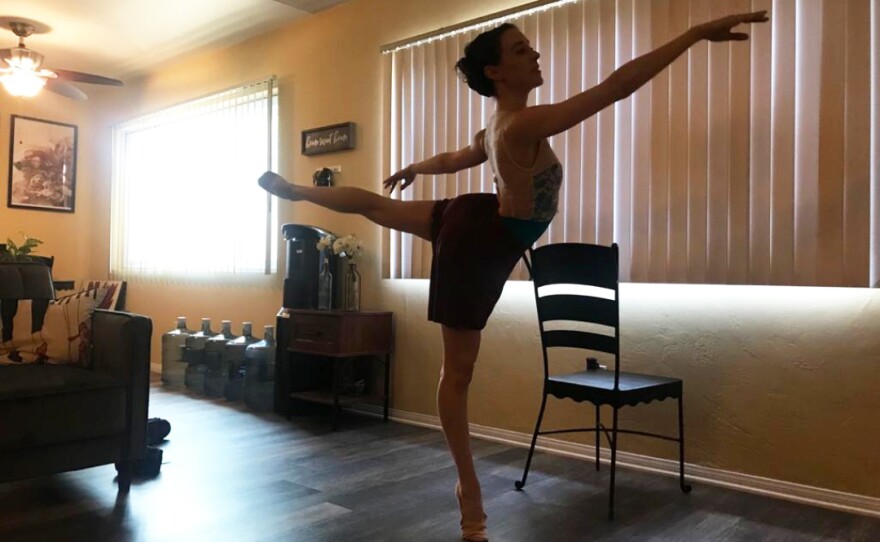There aren't many opportunities for extreme melodrama for ballerinas, according to Stephanie Maiorano, a dancer with the San Diego Ballet. In terms of highly theatrical acting, the roles are few and far between.
"Acting has always been the reason I wanted to be a dancer. I know nowadays the kids are seeing on Instagram how many turns you can do, how high you can get your leg or whatever. But mine was always moving to music and acting, big-time acting," Maiorano said.
At the top of Maiorano's acting wishlist is the titular role in the 19th century ballet, "Giselle," someone she has been wanting to portray since she was a teenager. After canceling the production's debut two years ago, the San Diego Ballet will finally perform "Giselle" on stage this weekend.
A role (and career) interrupted
Maiorano was 33 — already considered a veteran age for a ballet dancer — when the performing arts industry screeched to a halt with the pandemic, shortly before "Giselle" was supposed to open.

This week, as Maiorano prepares to perform as Giselle on a stage, in real life, she reflected on the strangeness of the last two years — but also how quickly a sort of normalcy crept back in.
"Mentally, it's as if I kind of blocked all that out. I know it happened. I have proof. But once you're in show mode, and you're back in the rehearsal space, and you're back to dancing, it feels normal — until we put our masks back on, because every now and then there's a surge or something and we're all told to put a mask back on. And then it's like a reminder that things aren't ever going to be really normal."
A fragile heart and the revenge of women scorned
Giselle is a young peasant girl with a weak heart, and she is kept from dancing by her overprotective father. She falls in love with Albrecht, a nobleman disguised as a villager. When his true identity and betrayal are revealed, Giselle becomes distraught. Stricken with heartache, she explosively, dramatically goes mad at the end of act one.
Giselle's madness scene is one of the most melodramatic scenes in ballet, and it embodies the type of acting that Maiorano wanted to pursue as a dancer.
"This is like the quintessential acting role for a ballerina," Maiorano said. "It's the only reason I really wanted to do 'Giselle,' because 'Giselle' has lots of jumps in it and I'm not much of a jumper, but she has this madness scene, so I don't care. I've gotta do this scene."
In the second act, the "wilies," or spirits of women scorned by their lovers seek revenge on men, and Giselle is conflicted. She's navigating being accepted by the spirits, while also forgiving Albrecht and still being in love.

The music tells the story
A "script" for a ballet is as much its choreography as it is the music. In "Giselle," the music by composer Adolphe Adams is precise, emotive and at times takes on an almost "Peter and the Wolf"-like pantomime effect, according to Maiorano.
"That music where she's dancing with Albrecht, it's — it sounds like crying. Like the violins are crying. They're pleading," she said.
When asked how she pulls off the madness scene — beyond following the prescribed steps of the choreography — Maiorano said she mines much of Giselle's character from the music.
"It's so easy to get lost in that character because it's almost like her character is written into the music: her personality, her thoughts, her everything is in the score. There's parts where it swells, and especially when there's fear involved — when you start dancing too much and then all of a sudden you're feeling your heart stop, the music gets darker. There's kind of like a spiraling out of it. And as I start to gain my breath, the music starts to slowly spiral back the other way. And it gets brighter. It's just. It's just such an amazing score," Maiorano said.
A backdrop of local relevance
"Ah, Giselle. The supernatural world… romanticism… ideals I tend to try not to wallow in. And yet, Giselle was the first ballet I ever saw," artistic director and choreographer Javier Velasco wrote in his director's notes. "That said, I have no need to stage a strictly traditional version of Giselle."
Instead of the ballet's traditional Middle Ages European countryside setting, Velasco opted for the history and geography of Old Town, San Diego in 1820. The village peasants from the traditional setting are transformed into Mexican peasants under the rule of Spanish nobility, and the wilies are "fantasmas" led by La Llorona.
San Diego Ballet spent the last few years adapting, with performances in non-traditional spaces, said executive director Matt Carney. "We refused to go dark during the pandemic," Carney said. "We are more than excited to get back in the theater with this show. Add the lights, costumes and a solid stage for dancers to dance, the theater is where the magic happens."
San Diego Ballet performs "Giselle" Saturday, May 21, 2022 at 8 p.m. and Sunday, May 22 at 2:30 p.m. at Balboa Theatre.
San Diego Ballet Presents 'Giselle'
- Add to Google Calendar
- Add to Outlook Calendar
Download ICS file







